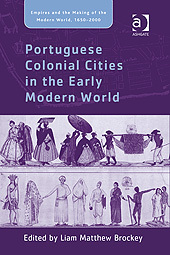Description
Portuguese Colonial Cities in the Early Modern World
Empire and the Making of the Modern World, 1650-2000 Series
Coordinator: Brockey Liam Matthew
Language: English
Subject for Portuguese Colonial Cities in the Early Modern World:
Keywords
Portuguese Colonial Cities; empire; Portuguese City; sanjay; Conselho Ultramarino; subrahmanyam; Afonso De Albuquerque; brazil; Colonial Brazil; swahili; Portuguese Empire; coast; East Indies; city; E Os; arquivo; Mozambique Island; histrico; BPE; ultramarino; Maria De Fátima; Santa Casa Da; De Macau; Colonial Administration; Zambesi Valley; Querimba Islands; Upper Town; Imperial Edifice; Malik Ayaz; Yosef Hayim Yerushalmi; East African Coast; Muzio Vitelleschi; Des Indes Orientales; De Angola; Common Granary
Publication date: 12-2008
Support: Print on demand
Publication date: 10-2016
· 15.6x23.4 cm · Paperback
Description
/li>Contents
/li>Biography
/li>




